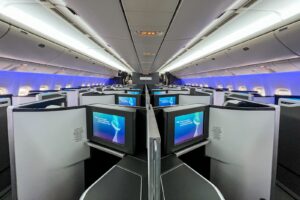It’s a pilot’s job market these days, and there are no signs of that changing soon. Case in point: Pilots at ultra-low-cost startup Avelo Airlines are set to receive another pay increase.
Avelo is raising pay for the fifth time since its inception in April 2021, aiming to make itself more competitive among the ultra-low-cost carriers and recruit more pilots as the airline industry faces a pilot shortage.
“If we offer what we believe is a pretty competitive pay rate, we think we’ll get a lot of people that find the quality of life and the pay as a big draw to stay here and become a part of a growing airline,” Scott Hall, Avelo’s head of flight operations, said in an interview with TPG.
Want more airline-specific news? Sign up for TPG’s free new biweekly Aviation newsletter.
The raises further solidify Avelo’s pilots as some of the most highly paid among the ultra-low-cost and regional carriers. Avelo pilots make more than those at Frontier, Allegiant and Breeze.
Beginning Nov. 1, first officers will now start at $131 a flight hour, up from $105, and captains will start at $240 a flight hour, up from $204. The scale tops off with first officers earning $201 a flight hour at the 12-year mark and captains making $298 a flight hour at the 12-year mark.
Avelo’s guarantee is at least 70 flight hours a month, meaning a first officer earns a minimum of $110,040 within the first year before sign-on bonuses; captains make at least $201,600 during the first year before sign-on bonuses.
Pilots have the option to increase their hours, and Avelo pays premium rates for those who fly more than 75 flight hours a month. The premium rates for first officers increased to $164 a flight hour in the first year, while captains can make $300 a flight hour during those longer months.
Hall said he hopes Avelo can attract more pilots and that the competitive pay can help the ultra-low-cost carrier stand out — not only against its competitors but also against some of the larger U.S. airlines, especially for pilots looking for an entry into the industry.
“This can be an entry point or you can also view this as a great place to grow with a company,” he said.
While recruiting pilots across the industry has been difficult, Hall said Avelo has been able to meet its hiring targets.
At a recruiting conference in Dallas, Hall said Avelo received about 200 resumes for potential pilots. The ultra-low-cost carrier currently employs 170 pilots but has plans to expand headcount.
Still, he described the recruiting process as “hand-to-hand combat.”
“It’s a lot of work to get people out there because they have a lot of options,” Hall said. “There’s a lot of opportunities out there, but we’re holding our own.”
On top of the increased pay, Avelo is also opening its own flight training center in Orlando in 2024. Avelo currently uses a third-party vendor in Dallas to train its pilots, but Hall said the new training center will emphasize Avelo’s status as a more stable airline rather than a new startup.
Founded in 2021, Avelo has lately ridden a surge of meteoric growth. The carrier’s business model of operating flights in cities with limited to no commercial air service has proven to be successful in the short term. The carrier has added an array of new routes within the past year and even expanded to Puerto Rico.
Meanwhile, the airline industry overall has struggled with an ongoing shortage of pilots in recent years. Mainline, regional and budget carriers have all offered various incentives or training programs to try and appeal to job candidates who find themselves in high demand.
As Avelo continues to expand, it also plans to add five additional Boeing 737 Next Generations to its fleet in 2024.
Despite the pilot shortage that continues to afflict the industry since the coronavirus pandemic, Hall reiterated that he was optimistic about Avelo’s future.
“We’re servicing a lot of markets and we see a lot of potential markets out there that we can provide our service to,” he said. “And we’ve been very happy with the pilots that we’ve been getting and we’re offering a lot of opportunities here.”
Related reading:
- When is the best time to book flights for the cheapest airfare?
- The best airline credit cards
- What exactly are airline miles, anyway?
- 6 real-life strategies you can use when your flight is canceled or delayed
- The best credit cards to reach elite status
- What are points and miles worth? TPG’s monthly valuations


